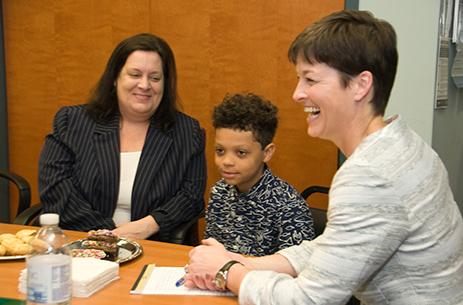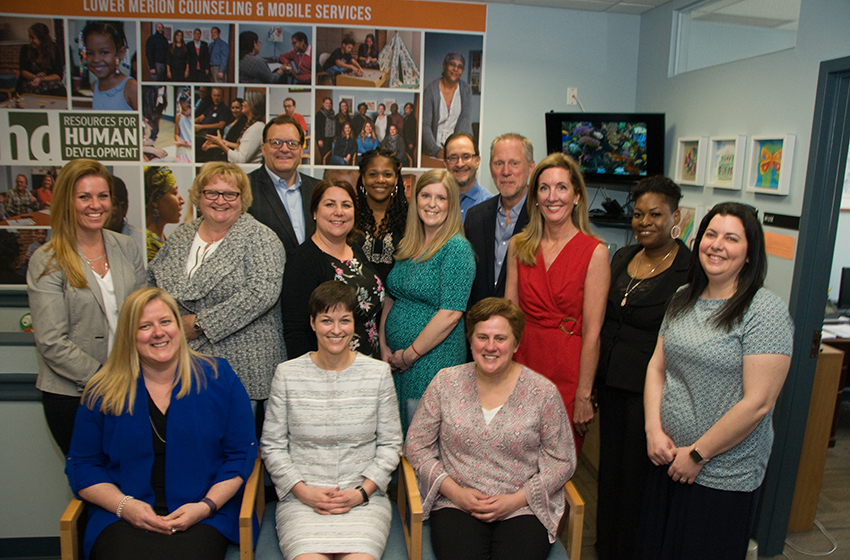RHD’s Lower Merion Counseling & Mobile Services welcomes DHS Secretary Teresa Miller

May 16, 2018
RHD’s Lower Merion Counseling and Mobile Services welcomed Department of Human Services (DHS) Secretary Teresa Miller for a visit and a chance to see firsthand how LMCMS has expanded services as one of seven Certified Community Behavioral Health Clinics (CCBHC) in the commonwealth that are jointly licensed by DHS and the Department of Drug and Alcohol Programs.
Miller was joined by Lynn Kovich, OMHSAS Deputy Secretary. The visit included a tour of the facility and a meeting staff and clients to discuss the successes LMCMS has experienced in the CCBHC implementation. LMCMS has expanded and improved behavioral health services through the CCBHC demonstration grant, given to only eight states by the U.S Department of Health and Human Services.
“We’re honored to have Secretary Miller and Deputy Secretary Kovich here to see how we’re integrating services and improving access to care through the CCBHC grant,” LMCMS director Kelly Clarke said. “We’re so grateful for the commitment DHS makes to ensure we can always deliver the highest-quality care in our community.”
As a CCBHC, Lower Merion Counseling and Mobile Services has added additional clinical staff allowing consumers to access more intense and frequent therapy services, as well as additional care coordination staff to maintain comprehensive treatment and support as individuals recover. RHD-LMCS has also been able to implement a more comprehensive training program whereby staff are trained in evidence- based practices and other specialized practices to best meet the needs of the individuals they serve.
“We are continually striving to serve more Pennsylvanians in the community and to make high-quality care available to each citizen of the commonwealth,” said DHS Secretary Teresa Miller. “At DHS we focus on coordination of care, and we believe that the CCBHCs are a vital component to ensuring Pennsylvania has the best behavioral health and substance use treatment available.”
The secretary was able to spend time with several clients (including 10-year-old Cameron, photo above), and others who expressed their appreciation for being part an outpatient center that meets their mental health and recovery needs. The visit concluded with a rendition of “Let It Be” by Robin, an LMCMS client who uses music as a coping skill, accompanied by LMCMS’ music therapy intern.

RHD founded LMCMS in 1970 as an outpatient mental health clinic. The program has grown and expanded to provide comprehensive therapeutic mental health and drug and alcohol services to individuals, families, and groups. LMCMS offers Recovery Support Teams and Peer Specialists to assist individuals in their recovery. Staff support individuals in their homes, communities, or locations of their choosing in accessing benefits and entitlements, fostering skills for community living, coordinate services for integrated health such as primary care, mental health, and/or substance use, and aid in the development of natural supports.
This year LMCMS expanded to open to a new child and family center, serving children, adolescents, and families with behavioral health treatment in a holistic and compassionate manner.
CCBHCs further the Wolf Administration’s goal of improving the delivery of care for behavioral health and substance use treatment in the community where people live, providing Pennsylvanians with easier and more consistent access to the services they need.
In 2015, the commonwealth was awarded the CCBHC planning grant; a federal grant that enables states to adopt innovative approaches to community-based behavioral health services. Each CCBHC is jointly licensed by the Department of Drug and Alcohol Programs (DDAP) as well as DHS. As part of the CCBHC initiative, both departments designed a matrix outlining the combined set of mental health and substance use disorder regulations that will be used to coordinate and streamline the licensing process.
CCBHCs allow individuals to access a wide array of services at one location and coordinate care across the physical and behavioral health service systems. For the adults and children with serious mental illnesses and substance use disorders that will primarily be served by these community clinics, the increased coordination and individualized care has the potential to greatly improve the quality of life for those served and their loved ones.
The Excellence in Mental Health Act established the CCBHCs to improve quality and use evidence-based practices in behavioral health.
The CCBHCs provide nine core services:
• Crisis services
• Targeted case management
• Outpatient mental health and substance use services
• Patient-centered treatment planning
• Screening, assessment, and diagnosis
• Psychiatric rehabilitation services
• Peer and family support
• Care for veterans and members of the military
• Outpatient primary care screening and monitoring.
For more information on the Planning Grants for Certified Community Behavioral Health Clinics, visit www.samhsa.gov/grants
For more information about CCBHCs visit www.dhs.pa.gov
Visit us on Facebook to see more photos from the day.


